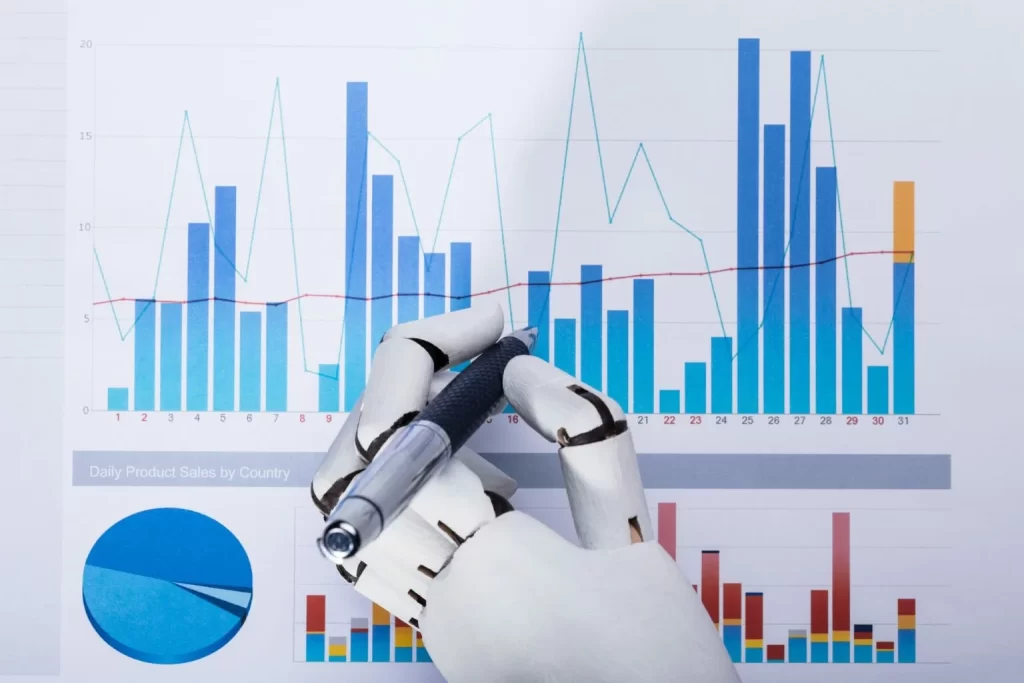
© 2024 | All Right Revered.

Business Development Lead
A tech enthusiast who helps businesses find the best technical teams to build their products and software.

The use of Artificial Intelligence to boost sales has transformed the way sales teams operate, making sales processes more efficient and productive. By utilizing trainable algorithms, AI tools analyze large data sets to make data-driven decisions, thereby saving time and increasing sales efficiency.
This article will discuss the importance of AI in sales, its benefits, and how it can revolutionize sales strategies to drive revenue growth.
Sales representatives spend only a third of their time actively selling, with the rest of the time spent on administrative tasks and meetings. AI can help reduce this time and boost productivity, making it an invaluable tool for sales teams. There has been a growing trend with sales teams from various startups making use of artificial intelligence to boost sales.
According to a study by Salesforce, AI is considered significantly more valuable in 2022 than it was in 2019, with Forrester predicting that the market for AI-powered platforms will grow to $37 billion by 2025.
With the automation and streamlining of repetitive tasks, processes, and real-time insights offered by AI, sales teams can work more productively. This frees up valuable time for sales professionals to focus on building relationships, closing deals, and driving revenue growth through artificial intelligence to boost sales.
AI-powered chatbots and virtual assistants can engage with customers in real-time, providing personalized and timely responses to inquiries, addressing concerns, and guiding customers through the sales process.
This enhances customer engagement, satisfaction, and loyalty, leading to higher conversion rates and repeat business.
Artificial Intelligence driven analytics and predictive insights help businesses analyze vast amounts of data, identify patterns, trends, and customer behaviors, and make data-driven decisions.
This helps sales teams to tailor their strategies, offers, and messaging to individual customers, resulting in higher sales success rates.
Leveraging recommendation engines powered by AI, businesses can provide personalized product recommendations based on customer data, purchase history, and behavior. This strategy can lead to customized sales experiences and increased conversion rates. Artificial intelligence to boost sales can significantly improve this.
Predictive analysis of historical sales data, market trends, and customer behaviors is one of the major use of artificial intelligence in the present times. It helps forecast sales outcomes and identify potential sales opportunities empowering sales teams to proactively identify and pursue high-potential leads, resulting in increased sales and revenue.
Artificial intelligence to boost sales is a game changer in this area.
Businesses that leverage AI in sales gain a competitive edge by staying ahead of the competition, delivering superior customer experiences, and driving revenue growth.
AI-powered sales strategies enable businesses to adapt and respond to changing market dynamics and customer preferences, helping them stay relevant and competitive in today’s fast-paced business landscape.
As AI continues to play an increasingly important role in sales, it is crucial to understand how to leverage artificial intelligence to boost sales and revolutionize sales strategies. Here are some ways in which it can be used to drive sales growth:

One of the most powerful applications of Artificial Intelligence in sales is predictive lead scoring. AI can analyze vast amounts of data to identify patterns and determine which leads are most likely to convert.
This allows sales teams to focus their efforts on the leads that are most likely to convert, improving efficiency and increasing sales revenue.
Sales teams can utilize AI technology to get valuable insights that enable them to improve lead volume, close rate, and overall client experiences. It can provide significant insights including customer base, such as buyer behavior, preferences, and purchase history.
By analyzing large volumes of data, AI can provide sales teams with a deep understanding of their customers and help them personalize their sales approach to improve conversions. Artificial intelligence to boost sales is revolutionizing this aspect of sales.
AI-powered chatbots are another tool that are trending high these days. Since the launch of ChatGPT, many companies are encouraging its teams to utilize it for increase productivity.
By providing customers with instant support and answers to their questions, chatbots can increase customer satisfaction and loyalty, leading to increased sales.
They also free up sales reps to focus on building relationships with customers and closing deals, rather than spending time on administrative tasks. Using artificial intelligence to boost sales through chatbots is a growing trend.
Sales process automation is another area where AI can improve efficiency and reduce costs.
By automating many of the administrative tasks that are necessary for successful sales, such as data entry and lead management, businesses can free up sales reps to focus on more valuable tasks. This can lead to increased sales revenue and improved productivity.
Finally, Artificial Intelligence can be used to track sales performance and provide insights into how sales reps can improve their performance.
By analyzing data on sales calls, customer interactions, and other metrics, AI can help sales reps identify areas where they need to improve, leading to increased sales revenue and improved team performance.
Artificial intelligence to boost sales is having a significant impact on sales performance management.
Artificial intelligence is transforming sales development by providing sales teams with unique information and insight, allowing them to focus on what is important: solving client issues.
Additionally, AI improves lead volume, close rate, and entire client experiences by using various processes, algorithms, and formulas. Artificial intelligence to boost sales is a game changer for sales professionals.

With AI, sales teams can promptly respond to changes in buyer journeys and increased buyer sophistication, improving their chances of closing a sale.
AI provides sales teams with instant access to data, creating a source of truth that ensures accuracy and validity. This reduces the time spent on administrative tasks and enables faster decision-making, ultimately boosting sales through artificial intelligence.
AI can assist sales teams in tracking prospects across multiple channels, such as social media, email, and phone calls, making it easier to reach potential customers.
A survey by HubSpot revealed that 61% of sales teams that exceeded their revenue goals utilized automation in their sales processes. AI is a key component of this automation, helping teams identify and prioritize high-value leads.
According to 33% of teams using AI, the adoption of this technology can enhance organizational processes. This is because AI can automate repetitive tasks, reducing the workload for sales teams and freeing up time for more strategic activities.
A study by McKinsey found that about 30% of sales tasks can be easily automated using existing sales technology, including AI. By automating administrative tasks, sales teams can focus more on selling and building relationships with customers.
AI can enhance the sales planning process with AI-based insights and predictive intelligence. This enables sales teams to forecast sales accurately and make informed decisions.
Using AI to communicate with client to resolve their issues can help sales teams personalize their interactions with customers, making them feel valued and appreciated. Artificial intelligence can boost sales by improving client communication.
Sales teams can leverage AI to identify the best sales practices by analyzing sales data and providing actionable insights.
Teams can utilize AI to enhance their accuracy of sales forecasts by providing predictive intelligence based on historical data.
While AI has the potential to revolutionize the sales industry, there are several challenges that sales teams may face when implementing AI solutions.
These challenges can include data privacy concerns, lack of integration with existing systems, and difficulty in aligning AI insights with sales strategies. In this section, we will explore some of the common challenges that sales teams may face during AI implementation, along with use cases that illustrate these challenges.

One of the most significant challenges in AI implementation is integrating AI solutions with existing data systems. This can be particularly difficult if the data is spread across multiple platforms, such as social media, CRM, and email.
An AI solution may need to be able to aggregate data from all of these platforms to provide accurate insights. Use cases of data integration challenges include:
The accuracy and quality of data can greatly impact the effectiveness of AI solutions. AI algorithms rely on large volumes of high-quality data to generate accurate insights. Poor-quality data can lead to inaccurate insights and decision-making. Use cases of data quality challenges include:
Data privacy is a significant concern in AI implementation, particularly when using customer data. AI solutions must be designed with data privacy in mind to protect customers’ sensitive information. Use cases of data privacy challenges include:
Implementing AI solutions in sales can require significant changes to existing processes and workflows. This can be challenging for sales teams, who may be resistant to change.
Change management is critical to ensure successful AI implementation. Use cases of change management challenges include:
AI solutions can generate complex insights that can be challenging to interpret for non-technical users. Sales teams need to be able to understand and interpret AI-generated insights to incorporate them into their sales strategies effectively.
Use cases of model interpretability challenges include:
Integrating AI solutions with sales processes can be challenging, particularly if sales processes are already well-established. AI solutions must be designed to integrate seamlessly with existing sales processes to avoid disrupting workflows.
Use cases of integration challenges include:
AI solutions can be expensive to implement, particularly for small and medium-sized businesses.
The cost of AI solutions can be a significant barrier to adoption, particularly if the ROI is not clear. Use cases of cost challenges include:
Artificial Intelligence is transforming the sales industry by streamlining and optimizing sales processes. With the help of trainable algorithms, AI tools can analyze large datasets and make data-driven decisions, saving time and increasing sales efficiency.
AI can reduce the time spent on administrative tasks, increase personalization, provide real-time data, and enhance sales planning and prediction.
AI can revolutionize sales strategies by enabling predictive lead scoring, sales forecasting, personalization, chatbots, sales process automation, and sales performance management.
However, implementing AI in sales also presents several challenges, including resistance to change, lack of data, integration, cost, and ethics. Successful implementation of AI requires careful planning, effective change management, and a commitment to ethical and responsible use of AI tools.
At Datics AI, we specialize in providing Data Science and AI services to help businesses leverage Artificial Intelligence tools to analyze large datasets, reduce time spent on administrative tasks, increase personalization, provide real-time data, and enhance sales planning and prediction.
Schedule a meeting with an expert to learn more about how we can help you revolutionize your sales strategies with AI.
Share the details of your project – like scope, timeframe, or business challenges. Our team will carefully review them and get back to you with the next steps!

© 2024 | All Right Revered.
This guide is your roadmap to success! We’ll walk you, step-by-step, through the process of transforming your vision into a project with a clear purpose, target audience, and winning features.